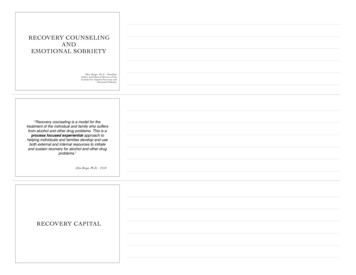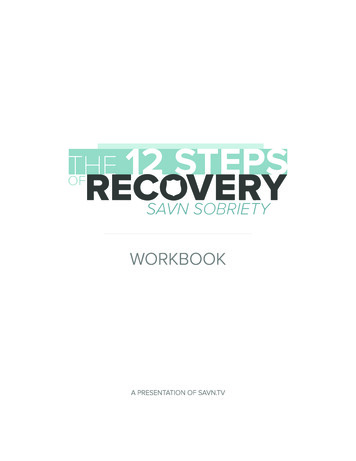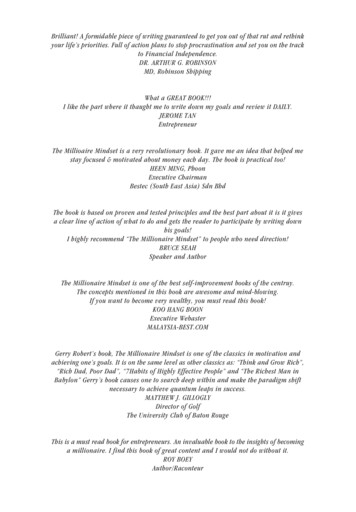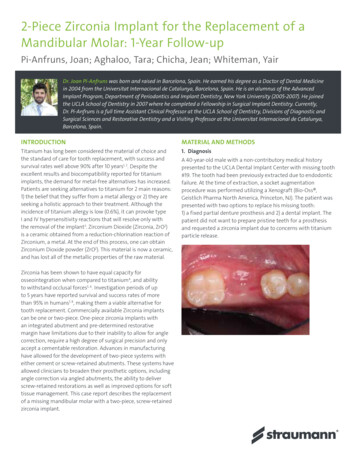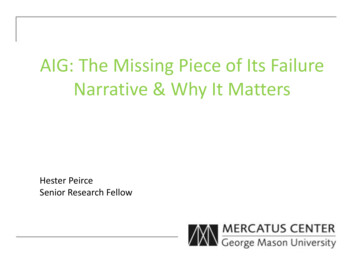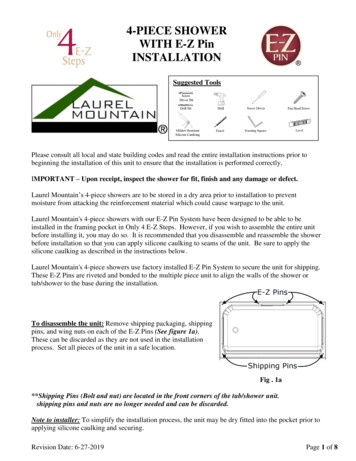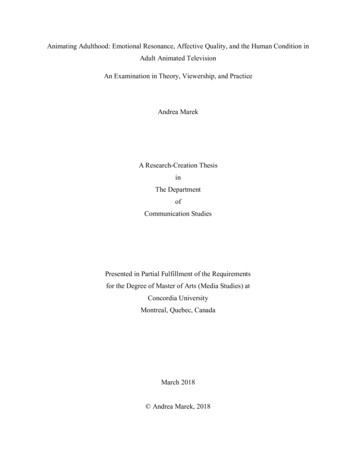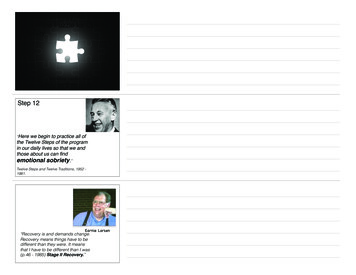
Transcription
Emotional Sobriety: An ImportantPiece of the Puzzle for OptimalRecoveryWorkshop Leader: Allen Berger, Ph.D.Clinical Psychologist and Hazelden AuthorStep 12“Herewe begin to practice all ofthe Twelve Steps of the programin our daily lives so that we andthose about us can findemotional sobriety.”Twelve Steps and Twelve Traditions, 1952 1981.Earnie Larsen“Recovery is and demands change.Recovery means things have to bedifferent than they were. It meansthat I have to be different than I was(p.46 - 1985) Stage II Recovery.”
Jung is reported to have told hispatient Rowland Hazard thefollowing:“Here and there, once in a while,alcoholics have had what arecalled vital spiritualexperiences . They appear to bein the nature of huge emotionaldisplacements andrearrangements. Ideas, emotionsand attitudes which were once theguiding forces for the lives of thesemen are suddenly cast to oneside, and a completely new set ofconceptions and motives beginto dominate them.Carl Jung, M.D.Pg. 22. Alcoholics Anonymous”Roland Hazard“Your programcannot take youfurther than yourdefinition ofrecovery.”Earnie LarsenStages of Recovery
Earnie described Stage OneRecovery as breaking thehold of our primaryaddiction.Earnie Larsen“Abstinence may get you out of a bad place, butgetting out of a bad place just gets you out; it is notthe same as getting to a good place (p.10).”“Victims of dry drunks havemade a First Step relativeto their addiction, but havenot made a First Steprelative to the livingproblems that underliesall addictions andultimately limits theirability to function inloving relationships.”Emotionalsobriety is thecure for sobersuffering.Earnie LarsenFred Holmquist - The Lodge at Hazelden
Emotional Sobriety involves becoming awareof and challenging our habitual attitudes andbeliefs about:Our ProblemOur SelfOur Relationships with OthersStage IIEarnie described StageTwo Recovery as“.rebuilding of the lifethat was saved in StageOne.”Earnie Larsen“ Stage II Recovery gets at the underlyingpatterns and habits that caused us trouble inthe first place. And if nothing changes, thennothing changes the same results will pop upthrough our whole life (p. 83).”
Many people in recovery “have made a First Steprelative to their addiction,but have not made a FirstStep relative to the livingproblems that underliesall addictions andultimately limits theirability to function inloving relationships.”Fred Holmquistdescribes thisexperience as“sober suffering.”Earnie LarsenFred Holmquist Author of Drop the Rock: The RippleEffect.Earnie Larsen“I believe that learning to loveand make relationships workis at the core of full recovery (p.15).”
Stage II Recovery iscontingent on emotionalsobriety.Emotional SobrietyandOur Emotional Center ofGravityThe Shift in the Location of the Emotional Center of Gravityin Emotional SobrietyI’mI’m OKOK evenif ?if ?
Emotional sobriety createstrueindependence ofspirit.Emotional SobrietyandLiving in the SpaceBetween the Stimulus andResponseThe Essence of Emotional SobrietyViktor Frankl, M.D.S“There’s a space between theStimulus and our Response. Inthat space is our power tochoose our response. In ourresponse lies our growth andour freedom - try to livethere.”R
SSpace Between the Stimulus and the ResponseEmotional Sobriety Lives HereRAutonomyIndividualityHolding on to YourselfSoothing and Supporting YourselfKeeping a Physical, Emotional and Spiritual BalanceMaintaining Your Emotional Center of GravityValidating YourselfHaving Flexibility in your Response-AbilityLetting the Best of You Run the ShowEmotional SobrietyandEmotional Maturity“ maturing is thetranscendence fromenvironmentalsupport to selfsupport. (p.28). ”Fritz Perls (1969). Gestalt TherapyVerbatim.Fritz Perls, M.D. - Founder of Gestalt Therapy
“If our freedom dependsexclusively on anotherperson allowing it, welose our own sense of thepart we must exercise inprotecting and definingour own psychologicalspace ”Drs. Miriam and Erving PolsterErving and Miriam Polster, Ph.D.Gestalt Therapy Integrated: Contoursof Theory and Practice (1973).Emotional SobrietyandResponsibility“Self-responsibility begins withthe recognition that I amultimately responsible formy own existence; that noone else is here on earth toserve me, to take care of me,or fill my needs.”Nathaniel Brandon (1996) TakingResponsibility.Dr. Nathaniel Branden
“So long as an individual cannotaccept the fact of what he is, cannotpermit himself to be fully aware of it,cannot fully admit the truth into hisconsciousness, he cannot movebeyond that point: if he denies thereality of his condition, he cannotproceed to alter it, cannot achievehealthy changes in his personalityDr. Nathaniel Branden(p. 110 - The Disowned Self).”I am responsible for the level of consciousness orawareness I bring to myrecovery, my relationship withmyself and others.what I do about my feelingsand emotions.my choices, decisions, andactions.having the best of me talk tothe best of you.the fulfillment of my desiresand needs.my level of humility.my life and well being.my emotional sobriety.how I deal with people.Emotional SobrietyandUnenforceable Rules
“Where a person experiences aloss or trauma in childhood thatundermines his sense of securityand self-acceptance, he wouldproject into his image of thefuture the requirement that itreverse the experiences of thepast.”Alexander Lowen, M.D.Lowen, A. (1975). Bionergetics. Penguin Book.“Desperationcreates Illusions illusions createdesperation.”“The critical point during thedevelopment, bothcollectively and individually,is the ability to differentiatebetween self-actualizationand the actualization of aconcept.”Fritz Perls, Gestalt Therapy and Human Potential. 1975,p. 74.Alexander Lowen, M.D.
“Many people dedicate theirlives to actualize a conceptof what they should be like,rather than to actualizethemselves.This is againthe curse of the ideal. Thecurse that you should notbe what you are.”Fritz Perls (1969). Gestalt Therapy Verbatim.True Self Model of Personal DevelopmentFalse selfTyrannyOf theShouldsSearch for GlorySearchForGlorySearch for GloryTrue SelfAlienationOfTrue SelfSearch for GlorySearch for GloryIdealized SelfThe Idealized SelfDespisedSelf
“The fostering of the phonyself is always at theexpense of the real self,the latter being treated withdisdain, at best like a poorrelative.”Karen Horney, M.D.Self Analysis - 1942, p. 23“At the core of this alienationfrom the actual-self is the lossof the feeling of being anactive determining force in ourown lives.”Neurosis and Human Growth: The StruggleToward Self-Realization“The self-actualizer expectsthe possible. The one whowants to actualize a conceptattempts the impossible.”Fritz Perls, Gestalt Therapy and Human Potential. 1975,p. 74.Karen Horney, M.D.
“The integrity of a person isimpaired because of the alienationfrom the self, the unavoidableunconscious pretenses, the alsounavoidable unconsciouscompromises due to unsolvedconflicts, the self-contempt - allthese forces lead to adiminished capacity for beingsincere with oneself.”Karen Horney, M.D.Neurosis and Human Growth: The Struggle Toward Self-Realization“Growing in a healthy waymeans liberating thoseevolutionary constructive forcesinherent in man which urge himto realize his givenpotentialities.”Karen Horney, M.D.The Therapeutic Process: Essays and Lectures - 1999, p.248.A Definition of Emotional Sobriety“Emotional Sobriety is when the best in youdoes the thinking and talking for all of you.This state of mind is achieved when what youdo becomes the determining force in youremotional well being rather than allowing youremotional well being to be overly influenced byexternal events or by what others are or are notdoing.”Allen Berger, Ph.D. - 2018
Bill’s Letter in 1956Emotional Sobriety: The NextFrontier by Bill Wilson (January 1958)I think many oldsters who have put our‘booze cure’ to severe but successfultests still find they often lack emotionalsobriety. Perhaps they will be the spearhead for the next major development inAA, the development of much more realmaturity and balance (which is to say,humility) in our relations with ourselves,with our fellows, and with God.Emotional Sobriety: The NextFrontier by Bill Wilson (1958)Those adolescent urges that so many of us have fortop approval, perfect security, and perfect romance,urges quite appropriate to age seventeen, prove tobe an impossible way of life when we are at age fortyseven and fifty seven.
Emotional Sobriety: The NextFrontier by Bill Wilson (1958)Since AA began, I’ve taken immense wallops in allthese areas because of my failure to grow upemotionally and spiritually. My God, how painful itis to keep demanding the impossible, and how verypainful to discover, finally, that all along we had thecart before the horse. Then comes the final agonyof seeing how awfully wrong we have been, but stillfinding ourselves unable to get off the emotionalmerry-go-round.Emotional Sobriety: The NextFrontier by Bill Wilson (1958)How to translate a right mental conviction into a rightemotional result, and so into easy, happy and goodliving. Well, that’s not only the neurotics problem, it’sthe problem of life itself for all of us who have got tothe point of real willingness to hew to right principlesin all of our affairs.Emotional Sobriety: The NextFrontier by Bill Wilson (1958)Even then, as we hew away, peace and joy may stillelude us. That’s the place so many AA oldsters havecome to. And it’s a hell of a spot, literally. How shallour unconscious, from which so many of our fears,compulsions and phony aspirations still stream, bebrought into line with what we actually believe, knowand want! How to convince our dumb, raging andhidden Mr. Hyde becomes our main task.
Emotional Sobriety: The NextFrontier by Bill Wilson (1958)I’ve recently come to believe that this can be achieved. Ibelieve so because I begin to see many benighted ones,folks like you and me, commencing to get results.Last autumn, depression, having no really rational causeat all, almost took me to the cleaners. I began to bescared that I was in for another long chronic spell.Considering the grief I’ve had with depressions, itwasn’t a bright prospect.Emotional Sobriety: The NextFrontier by Bill Wilson (1958)I kept asking myself, ‘Why can’t the Twelve Stepswork to release depression?’ By the hour, Istared at the St. Francis Prayer ’it’s better tocomfort than to be comforted.’ Here was theformula all right, but why didn’t it work?Emotional Sobriety: The NextFrontier by Bill Wilson (1958)Suddenly, I realized what the matter was. My basicflaw had always been dependence, almost absolutedependence, on people or circumstances to supplyme with prestige, security, and the like. Failing toget these things according to my perfectionistdreams and specifications, I had fought for them.And when defeat came, so did my depression.
Emotional Sobriety: The NextFrontier by Bill Wilson (1958)There wasn’t a chance of making the outgoinglove of St. Francis a workable and joyous wayof life until these fatal and almost absolutedependencies were cut away.Because I had over the years undergone a littlespiritual development, the absolute quality ofthese frightful dependencies had never beforebeen so starkly revealed.Emotional Sobriety: The NextFrontier by Bill Wilson (1958)Reinforced by what grace I could secure in prayer, Ifound I had to exert every ounce of will and action tocut off these faulty emotional dependencies uponpeople, upon AA, indeed upon any act orcircumstance whatsoever.Then could I be free to love as Francis did. Emotionaland instinctual satisfactions, I saw, were really theextra dividends of having love, offering love, andexpressing love appropriate to each relation of life.Emotional Sobriety: The NextFrontier by Bill Wilson (1958)Plainly, I could not avail myself to God’s love until I was able tooffer it back to Him by loving others as He would have me. And Icouldn’t possibly do that so long as I was victimized by falsedependencies.For my dependencies meant demand, a demand for thepossession and control of the people and the conditionssurrounding me. While those words ‘absolute dependence’ maylook like a gimmick, they were the ones that helped to triggermy release into my present degree of stability and quietness ofmind, qualities which I am now trying to consolidate by offeringlove to others regardless of the return to me.
Emotional Sobriety: The NextFrontier by Bill Wilson (1958)This seems to be the primary healing circuit: an outgoinglove of God’s creation and His people, by means of whichwe avail ourselves of His love for us. It is most clear thatthe real current can’t flow until our paralyzingdependencies are broken, and broken at depth. Onlythen can we possibly have a glimmer of what adult lovereally is.Emotional Sobriety: The NextFrontier by Bill Wilson (1958) . If we examine every disturbance we have,great or small, we will find at the root of it someunhealthy dependence and its consequentdemand. Let us, with God’s help, continuallysurrender these hobbling demands. Then we can beset free to live and love: we may then be able to gainemotional sobriety.Emotional Sobriety: The NextFrontier by Bill Wilson (1958)Of course I haven’t offered you a really new idea onlya gimmick that has started to unhook several of myown “hexes” at depth. Nowadays, my brain nolonger races compulsively in either elation,grandiosity, or depression. I have been given a quietplace in bright sunshine.”
“We had to learn ourselves and, furthermore,we had to teach the despairing men, that itdid not really matter what we expectedfrom life, but rather what life expected fromus .we needed to think of ourselves asthose who were being questioned by life Life ultimately means taking theresponsibility to find the right answer toits problems and to fulfill the tasks whichit constantly sets for each individual.”Viktor Frankl, M.D.Viktor E. Frankl (1959). Man’s Search forMeaning.Step 10“Finally we begin to see that all people,including ourselves, are to some extentemotional ill as well as frequentlywrong and then we approach truetolerance and see what real love for ourfellows actually means. It will becomemore and more evident as we go forwardthat it is pointless to become angry orto get hurt by people, who like us, aresuffering from the pains of growingup.”Twelve Steps and Twelve Traditions, 1952 - 1981.“.sobriety is only the bare beginning.It is only the first gift of the firstawakening. If more gifts are to bereceived, our awakening has to go on.And if it does go on, we find that bit bybit by bit we can discard the old life –the one that didn’t work – for a new lifethat can and does work under anyconditions whatever. Regardless ofworldly success or failure, regardlessof pain or joy, regardless of sickness orhealth or even of death itself, a new lifeof endless possibilities can be lived ifwe are willing to continue ourawakening.”.Bill Wilson (1957)
Contact InformationAllen Berger, Ph.D.2200 Pacific Coast Highway, Suite219Hermosa Beach, CA 90254818-584-4795E-mail: abphd@msn.comWebsite: www.abphd.com
Fred Holmquist - The Lodge at Hazelden. Emotional Sobriety involves becoming aware of and challenging our habitual attitudes and beliefs about:! Our Problem! Our S
